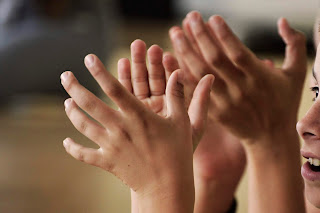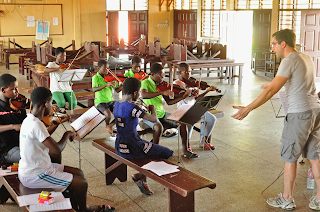Two Children Overcome Trauma with the Help of Music
Fukushima, Japan
Hana grew up on the coast of Fukushima and in 2011, when the tsunami came, she was 12 years old. Her family survived, but many of her friends died in the disaster. Because of the nuclear accident that followed, Hana’s family had to evacuate their town. They left everything behind and at first moved to an emergency shelter, and a few months later to a town in the nearby mountains.
The relocation was hard. Her family, who used to be apple farmers, found it impossible to make a living, as suddenly nobody wanted to buy products from Fukushima. In her new school, Hana tried to make new friends, but other children made it known that they didn’t want to play with her, or come near her: they said she was “contaminated”. The new environment was affecting her, she started finding it hard to keep up with school assignments and soon fell in depression. Around this time, she came across the Fukushima Youth Sinfonietta, the orchestra created by Keys of Change.
Hana had played the cello in her primary school orchestra, participating in competitions together with her old friends, some of whom were now gone. Joining this new orchestra, and meeting for the first time young people her age that were facing similar difficulties, the Fukushima Youth Sinfonietta became the first place she could finally make friends after changing schools. Having found her musical voice again, she practiced twice as much as anybody else in the group. After months of hard work, she walked on stage together with her new friends of the Fukushima Youth Sinfonietta for the first time, and she did so as a section principal for the cellos. Showing her support and care for her group as a leader, at the end of that first performance she couldn’t hold back the tears: for missing her friends that would never play music together again, and the feeling of hope created by the new bonds forged through musical sounds.
Today, several years later, Hana is a university student, hoping to become a primary school teacher one day. She still plays the cello.
******
Belgrade, Serbia
Stefan cannot remember a time in his life without violence. He was born in Belgrade and never met his father. His teenage mother, a heroin addict, took Stefan with her from one boyfriend’s home to the next. She often left him behind by himself or with strangers, when she went out at nights. He experienced abuse from a very young age and he quickly had to learn to take care of himself. Keeping quiet, and away from the adults, had the best chances to avoid a beating. By the time he was 9, Stefan had only attended school occasionally and never learned to read or write.
A week before his tenth birthday, his mother was taken away by the police and Stefan was taken away by social services. He was sent to a children’s home in the outskirts of Belgrade where many children came from similar backgrounds. At his new home, Stefan remained silent for weeks on end and felt constantly agitated and angry. He tried to run away, only to be brought back after he was found sleeping on a nearby bench. At the school he was enrolled in he found it impossible to follow the lessons.
One day, back at the children’s home, Stefan heard a group of children singing together a song that his mother sometimes used to sing for him. By complete chance he had stumbled upon the music classes organised by Keys of Change in this children’s home in the outskirts of Belgrade. The following Friday he came to the class, sat at the back and sang together with the group. Singing made him feel better, at least, after a long time, not angry. It wasn’t long then before he started talking to the other children in the group.
It has now been two years and Stefan still hasn’t seen his mother. His progress has been slow, and he still feels anger often, but learned how to read and write and was able to graduate from primary school. Friday is his favourite day of the week, when he goes to the music class. Apart from singing, the teacher showed him how to play a few simple melodies on the piano. He likes most when they sing sad songs. because it seems to him that he can let out what he would never properly express with words. The music class is the only place where he feels no anger, and the only place he ever had friends.
*NB Names, events and specific details have been altered in a way to protect the identities of individuals.


Comments
Post a Comment